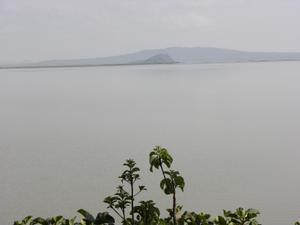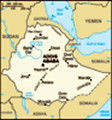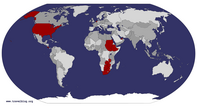Advertisement
Published: October 14th 2005

 Lake Tana
Lake Tana
The lake is really beautiful but surprisingly not used much. Ethiopians don't typically eat fish and there is not much tourist trade here. So it's very much like it was 100 years ago.June 11
This morning we took a flight from Addis to Bahir Dar in the northern part of Ethiopia. I have to say today was the day that the fact that I lost my bags affected me the most. I wished for my bag of clothes and personal items first and got them. Now coming here I would have traded my clothes for the bag with supplies. How selfish am I that I wanted” my stuff” first, for fresh clothes. The people here have basically nothing. The few things that I brought to Africa would have made so many so happy.
Bahir Dar is one of the poorest regions in the country; it has the highest infection rate of HIV, battles Malaria and TB. It is a city of about 100,000. Most of the people live far outside the city in rural areas and have no money nor do they receive city services.
The city sits next to Lake Tana. I think this lake was the second largest in Africa at one time. The largest lake being in Kenya. (Not sure about this fact, but it sounds good)
I was surprised to see the people in tribal

 Market Day
Market Day
This is the market area where people carry their goods to trade miles and miles from home. clothing and people in western clothing walking along side each other in the streets. It was amazing to see two such different “styles” in the same place.
We took a trip to the “jungle”… not jungle like rain forest but jungle like grassy plains, with no services, like electcity or water, just huts goats and cows. These people are shepherds, herding their flocks, cooking with wood or dried cow patties, washing clothes and bathing in the river… about as primitive as one can get..
The saddest thing is to see tiny children like 2 years with stomachs so blotted with malnutrition and the look of hunger in their eyes. These children start to beg when they see you. They try to sell you small crafts that they have made for the very few tourists who visit. This area is relatively unknown by tourist from the west, mainly it is used by Ethiopians as a tourist location.
So I was almost attacked by every one both adult and children alike, asking for Birr (local money) or PENS!! (Yes pens, which I was lucky enough to have a very few with me most were in the missing red

 Women go to market
Women go to market
The loads that they carry to market are very large. Both the very old and young work to move the things to the market, it takes a great effort but once there it is very social. They do this every Saturday.bag.) You would think that pens were gold. Adults and kids would push and fight to get their hands out to get one BIC. I have never seen that before where kids would weep, if they didn’t manage to get one. I tried to give the smallest ones pens, but the adults in broken English would say, “I want to go to school” or “ my sick child would make so happy”. Meanwhile, all I could think of was the hundred I had packed in my bag, not to mention the LIVESTRONG bands that would have been so welcome.
A pen was so precious to them that as we were headed off they were all gathered around showing each other what they had. It was like I have given them pieces of gold. I have to say it doesn’t make you feel good to give these people something; it makes you weep inside, for what you can’t give them. Just the things I carried with me to make this journey, like this computer and my camera, could change a whole village's lives. It makes you sad to know that most of these people will clamor for pens from

 Blue Nile Falls
Blue Nile Falls
Once the falls reached all the way across this ridge but Ethiopia needed power so that is no more.strangers their entire life. It is almost impossible to get an education to get out of this situation, when food once a day is the biggest struggle one has to address.
We walked into the “bush” to see Blue Nile Falls, a water that used to be the second largest in Africa next to Victoria Falls. The country needed power so they built a hydro- electric damn which diverted water from the falls for electcity. It is sad in one sense that this beautiful waterfall was cut down to a fifth of what it once was, but this country needs so much I can understand why the decision was made. The funny part is where the Falls are, these people have no access to electicity, but the tall power lines run over the village huts, leading to the city.
Saturday in the region is market day, where people walk for miles with bundles of wood, produce from their gardens, whatever could be sold or traded. They walk with some children carrying heavy loads; the lucky ride on donkey carts, but most are on bare feet walking across the rock-covered roads, that lead into the market, from their
villages. Many carry umbrellas because the sun is very hot here. It takes a full day to walk, trade your goods and walk home. I have never seen so many people with no shoes walk on roads (they say gravel roads here, I say rocks) for miles, just to trade a few things for the coming week. It was an amazing sight. What is funny everyone waves as you go by in your truck because so few cars travel into the villages. It is a real sight to see a truck drive by with tourist's taking pictures along the way. Most of the pictures I took were as we bumped along down the roads on our way to the falls.
June 12
Today was a day that I got to see beauty and despair. We took a small boat very early in the morning out on Lake Tana to where the Nile river begins. I have to admit I was a little nervous because this lake is huge and the boat is small. I thought if we tip over could I swim to shore, but I will tell you in a moment why that fear was tempered.

 Bathing in the River
Bathing in the River
The mother washes her clothes while the children bath themselves. Note their stomaches and how bloated they are from malnutrition. Along the way to the monasteries we saw all kind of birds, to many species to count. (I thought about you, Ellie) We saw three Hippo’s making their way across the river, going under the water and then suddenly popping up for air. They are very large but excellent swimmers and very mean the locals say. I took so many pictures because everything is beautiful.
We arrived at a small monastery and we were meet by children selling small boat toys they had made. There are only about 20 people who live in this tribe. They live in traditional huts with no light, water or space. The only thing I saw from this century was small radio, a soldier had while visiting home. Everything else except, for some western clothes has not changed for centuries. We talked to a monk (which by the way most do not speak English in the country). He brought out books that were written more then a hundred years ago on goat skin paper. It was interesting, they still do the same reading the same way a century later.
Then I interacted with the children. I brought a lot of

 Children Follow
Children Follow
As we wander through the bush, everyone followed. I think they were hoping I had more to give them but also I think we were Sat. afternoon entertainment.boats and give the ones without boats to sell 1 Birr… they were jumping up and down and screaming in joy. Just to get a concept of what a Birr is worth the 1 US dollar is 8.60 Birr. Everything (other then the Sheraton) is so cheap, I brought dinner for 2 people and it was 40 Birr with tip. So giving the children 1 Birr is nothing. They told me that everyday in their own boats, they cross the river and walk one hour to school. The youngest was 5 and he had his own boat and crossed the river too, with hippos. (That’s when I thought I am silly for being scared in my motorboat, as I cross.)
There is so much I could say about those children and how some seemed bright and outgoing, others were shy and withdrawn. However, all when I pulled out the Birr fought their way in to get some.
We went in a traditional hut and a women and her small child were making coffee, grown from their land. They had all kinds of vegetation there, but the main crop is Chi. Chi is a plant “drug” that most are

 The girls in green
The girls in green
This is typical Ethiopian dress for girls in the rural areas. They were very sweet and many don't go to school it's too far.addicted too, it makes you high. It is not against the law, but it is a serious problem here. However, for a farmer it gets a good price, so you see Chi farms everywhere.
The hut is pitch black, no light at all, so people in their huts sit in the dark, with only the light from the door where the cow patty fire is, and they do their cooking. It was amazing this hut was not bigger then a walk-in closet and an entire family with one small straw mat to sleep on, lives there. The rural area was really an experience, but the city of Bahir Dar was completely another.
Please Read this section first if you are reading this to your kids, I want you to know what it is like, but I want you to decide on what is OK for your children.
The city had no taxi service, they are on strike. But the streets were full of people walking. The numbers of hungry and starving, homeless on the street are completely without descriptions. I can’t tell you have many old, young, blind, deformed and sick people there were begging. I

 A Community
A Community
These are typical huts that haven't changed in the last 200 or more years, except for the powerlines that run over top. I also took this picture in black and white to show that this could have easily been taken a hundred years ago if you crop out the powerlines.also can’t count the number of soldiers with guns there were either. I saw so many people that had some sort of birth deformity that literally lay in the middle of the streets and cars would just steer around them. Old woman, men, children begging for change. It was very overwhelming at times because everyone would see me with my camera and bag and come to ask for Birr. I must admit I took no pictures while we walked the streets. I felt it was wrong for me to photo the suffering. I couldn’t bring myself to stop and photo someone in their darkest moment. I felt I had no right to make them look into the camera and know why I am taking their picture. Not because they are beautiful, but because they are sad. But, I had no idea of what suffering could be until I visited the hospital.
We went Bahir Dar regional hospital and I will tell you that I couldn’t have imagined conditions worse then this. The hospital I saw in Addis was a palace in comparison. Once again I didn’t want to take pictures, I felt it was not right to photograph someone

 Woman and Child
Woman and Child
This is the inside of a hut, my flash lights the hut up but usually it is total darkness. Her living is collecting cow patties to sell for fuel.dying.
Hundreds come daily trying to get a bed and there are not many to be had. The hospital is so overcrowded that to my horror, we walked through one room with 8 -9 patients, most dying from HIV or TB. Out the doors we walked and lined up along a wall are 10 more beds of sick and dying patients outside in the elements. It rains everyday in Ethiopia, thunder, lightening and wind. These sick people in cloth beds are outside. I was amazed and bewildered. There was one woman dying outside who was laying there too weak to swat the flies from her face, as 6 or 7 flies, sat on her face, as if she was not there at all.
Not only is there no space but the hospital itself is unclean. The blankets patients wrap themselves in were dirty. Each bed had a bucket so patient's could use it for the bathroom; there was no privacy everyone together in one place. Mostly all the patients were sick from HIV. There are many family members that just gather around the bed for comfort. There is no TV, radio or distraction from your surroundings. People

 A soldier
A soldier
There were so many soldiers in the city just making a presence.lay moaning in pain and dying around you. There was only 1 Internist that sees most infected patients and very few staff. They are overwhelmed by the numbers coming everyday single day, for care and hope. This I hear is not the worst of the hospitals in Ethiopia, which I refuse to believe. I can’t imagine worse.
For those not interested in HIV info skip this paragraph.
Standards of care here are shocking, at best. The medical equipment here is almost non- existence. The lab technology is minimal, at best, the numbers of trained health care workers are very few. The medicine supply is level one drugs and access to level one meds are difficult.
So you have a health care system that is taxed by the worst disease in this century, with no tools for care and treatment. The basic stuff we do in the US for HIV like viral load (counting the virus) is not the standard here because most labs can’t do it. They do no drug resistant testing (genotype or phenotypes) in the entire country. Yet, they do know there are a lot of drug resistant virus here, with people taking meds

 Our host Dr. Ayele shows their picture
Our host Dr. Ayele shows their picture
The good thing about a digital camera is that you can show people their picture, this was a great hit. This made me sad because again all the polaroid film I brought would have made their whole month.very inconsistently. They have no drugs to counter act the side affects of anti-retrovirals, so people don’t take them well, because sometimes it makes them sicker. Most have no money for care, until they are full blown AIDS. Then families sell everything to get them to a hospital. Many times it is too late to save them. I know the US has it problems with HIV funding and care, but this really puts it into perspective for me.
I don’t want to leave everyone with a bad impression of this country; it is truly a beautiful place. They have restaurants where people are just people, who laugh and enjoy themselves. They have the wealthy and the middle class. All is not about poverty or the sick; they have all sides of life like we do. It's just that it is hard not to see the other side here, where in the US, we can just look away and stay in our homes and forget that others are not so fortunate.
Ethiopia has a presence about it’s self that is unlike any I have experienced. Iit’s land is quiet and demanding, at the same time, it’s people are refrained, but gracious. Their story is sad, but enlightening and their future is both optimistic and bleak. What I am saying is that Ethiopia is not just bad or good, it’s like all places, the problems are so overwhelming, but the children still laugh, play and love, which gives this place, HOPE.
Advertisement
Tot: 0.111s; Tpl: 0.015s; cc: 10; qc: 55; dbt: 0.076s; 1; m:domysql w:travelblog (10.17.0.13); sld: 1;
; mem: 1.2mb












deleted_4142
deleted_4142
Thank you for sharing
Kim, I am speechless and emotional from reading your entries. The contrasts in your entries are overwhelming. Thank you for continuing to share your trip. We have been praying every day for you. Much love, Valarie, Stewart and Garrett